How Does Fat Leave the Body? Unraveling the Science of Weight Loss
Table of Contents
Key Highlights:
- Fat is an essential part of the human body, playing roles in energy storage and insulation
- Fat loss occurs through a process called lipolysis and beta-oxidation, which converts fat into energy
- Most fiat loss byproducts, such as carbon dioxide and water, leave the body via respiration, urination, and perspiration
- Factors like diet, exercise, hormones, and metabolic rate can influence individual fat loss patterns
- To promote fat loss and maintain a healthy weight, it’s essential to make smart dietary choices, stay physically active, and address factors like sleep and stress management
Introduction
Fat loss is often not fully understood. Do you know how does fat leave the body? where it goes when you lose weight? You’re not alone if you’re unsure. Here, we’ll explain the science of fat loss. It will also have useful tips for weight loss.
You might think that fat turns into energy or muscle. But it’s not that simple. Let’s dive deeper to understand the process. We’ll look at the role of fat. We’ll explore how your body burns fat. We’ll talk about the factors that affect fat loss. Lastly, we’ll share tips for weight control.

Did you know?
- The majority of fat is exhaled as carbon dioxide when we lose weight. [source: nih.gov]
- Fat is broken down into carbon dioxide and water during weight loss. [source: nih.gov]
- Only a small amount of fat is converted into energy or heat during weight loss. [source: nih.gov]
- Fat cells shrink in size when we lose weight, but the number of fat cells remains the same. [source: nih.gov]
- Breathing is the primary way fat leaves the body when we lose weight. [source: nih.gov]
The Science of Fat and Weight Loss
Have you ever thought about what fat is? How does fat leave your body? How does it work in our bodies? Let’s look at different body fat types and their roles. We’ll also explain how our body stores and uses fat.
The Role of Fat in the Human Body
Fat has key roles. These are:
- Storing energy: Fat stores extra energy as triglycerides
- Keeping us warm: Fat insulates us
- Making hormones: Fat tissue makes hormones that control many biological processes
Research has indicated that fat is eliminated from the body during its metabolism. This metabolic process produces two byproducts, namely water and carbon dioxide, which are expelled from the body through mechanisms such as sweating, urination, and exhalation of carbon dioxide from the lungs.
Types of Body Fat
Here are two main body fat types:
- White adipose tissue (WAT): It stores energy. It releases fatty acids when energy is low. You can find it under your skin and around your organs.
- Brown adipose tissue (BAT): It’s “good” fat. It controls body heat by burning calories. It comes from muscle tissue. It has more mitochondria than WAT.
How our body stores and utilizes fat
Triglycerides and the energy storage process
When you eat too much, the extra energy becomes fat. This fat is stored as triglyceride molecules. Triglycerides contain carbon, hydrogen, and oxygen atoms. Over time, if you keep eating too much, you gain weight. Your body composition also changes.
Let’s delve into the following table and see the function of each type of body fat:
| Type of Body Fat | Function |
| White Adipose Tissue (WAT) | Energy storage, insulation, hormone production |
| Brown Adipose Tissue (BAT) | Regulating body temperature by burning calories for heat |
The Fat-Burning Process
To shed weight, your body needs to use stored fat for energy. This makes your fat cells smaller. So how do we make this happen? Let’s discuss fat oxidation.
Turning fat into usable energy
- Lipolysis and beta-oxidation
Lipolysis is a process where thefat cells release stored triglycerides into the bloodstream.. These are broken downinto free fatty acids. Then, these fatty acids go through beta-oxidation to release ATP (adenosine triphosphate) molecules along with water and carbon dioxide. ATP is the energy source for all body cells.
Fat loss byproducts and how they leave the body
- Water, carbon dioxide, and energy
When stored fat breaks down, it turns into water, CO2, and energy
- The role of respiration in fat loss
While breathing, we breathe out CO2. About 84% of lost fat leaves our bodies as CO2.
- Excretion via bodily fluids
The remaining 16% of lost fat becomes water. This leaves our bodies through urine, sweat, and other bodily fluids.
Now, have a look at the following table to understand how fat loss byproducts leave our bodies:
| Fat Loss Byproduct | Mode of Excretion |
| Carbon Dioxide (CO2) | Respiration (breathing out) |
| Water (H2O) | Urination, perspiration, and other bodily fluids |
To my knowledge, when the body metabolises fat, it exits in the form of water through sweat and urine.
Factors Influencing Fat Loss
A lot of things can affect your rate of fat loss. Your diet, exercise routine, hormones, and metabolism.Each plays its part.
1. Diet and nutrition
Eating well is important for weight control and fat loss. If you don’t eat right, your body won’t burn fat as it should. Getting the right balance of carbohydrates, proteins, and fats is key. Each plays a unique role in your body. The right balance may provide enough energy and support fat loss.
2. Exercise and physical activity
- The role of exercise in burning fat
Exercise helps burn calories. This creates a calorie deficit and aids fat loss. It also improves blood circulation, feeding our cells with oxygen and nutrients. This may help remove waste too.
- Different types of workouts for maximizing fat loss
Mixing up your workouts is helpful. Some good ideas are aerobic activities, resistance training, and high-intensity interval training (HIIT). This may help with fat loss.
3. Hormonal balance and metabolic rate
- Influence of hormones on fat storage and burning
Hormones play a big role in weight and body fat control. For instance, insulin and leptin can affect your appetite and energy balance.
- How metabolism affects weight loss
Your metabolism determines how efficiently your body changes food into energy. A slow metabolism can make losing weight harder. But a quick one can help burn fat.
Kindly refer to the following table for the impact each factor has on weight loss:
| Factor | Weight Loss Influence |
| Diet and Nutrition | Promotes healthy eating habits and macronutrient balance |
| Exercise and Physical Activity | Increases calorie expenditure, blood flow, and oxygen delivery |
| Hormonal Balance | Influences appetite control, fat storage, and energy balance |
| Metabolic Rate | Determines how efficiently your body converts food to energy |
Where Does Fat Go First During Weight Loss?
Fat loss patterns in the body
Different people may lose fat in different patterns. This is due to factors like genes, sex, and lifestyle habits. But remember, you can’t lose weight from just one body part at a time.

 Upto 50% from PharmEasy.in
Upto 50% from PharmEasy.inFactors Affecting Fat Loss Distribution
Your genetics, hormones, and body structure can affect how and where you lose fat. Certain medcations and health conditions can too.
Stubborn Fat and why it’s Hard to lose
Even though fat loss is gradual, some areas may be tougher. The belly and hips, for example, can resist fat loss. They have more alpha 2-adrenergic receptors, which slow down fat burning.
Tips for Promoting Fat Loss and Maintaining a Healthy Weight
If you want to lose weight and stay healthy, here’s what you may do:
1. Smart dietary choices
- Portion control: Watching what you eat can prevent overeating. It can help with weight loss too.
- Incorporating whole foods and avoiding processed foods: Eat whole foods. Stay away from processed ones. This gives you the nutrients you need. It also supports a balanced diet, good health, and fat loss.
2. Staying physically active
Including fun activities makes it easier to stick to a workout routine. It gives better weight loss results. Just make sure your workout plan fits your fitness level and your goals.
3. Ensuring proper sleep and stress management
Bad sleep and stress can make you put on weight.They throw your hormones off balance, causing hunger and fat storage. If you tackle these, you’ll have better weight loss.
However, if you suffer from any medical condition, its best to consult your healthcare provider and know what type of exercise and diet will be most suitable for you to achieve your goal.
Look at the following table to understand how each tip helps in weight loss and maintenance:
| Tip | Effect on Weight Loss and Maintenance |
| Smart Dietary Choices | Promotes balanced eating and nutrient intake |
| Staying Physically Active | Boosts metabolism and increases calorie expenditure |
| Proper Sleep and Stress Management | Supports hormonal balance for optimized weight control |
Also Read: How to Lose Face Fat: Proven Methods to Try at Home
The Challenge of Keeping Weight Off
Factors contributing to weight regain
You can put weight back on if you go back to poor eating, stop working out, or ignore hormonal imbalances.
Strategies for maintaining a healthy weight
To stay at a healthy weight, stay true to your diet, keep exercising, and manage stress. The earlier tips may help you do this.
Conclusion
Knowing how fat loss works is key to losing weight. Remember, every person’s journey is different. Factors such as diet, exercise, hormones, and metabolism affect how you lose fat and your success. By using the practical tips shared here, like eating right, exercising often, and dealing with sleep and stress, you’re more likely to lose fat and stay healthy for many years to come.
Losing fat needs hard work, consistency, and a clear understanding of weight loss science. As you start on your weight loss journey, remember, changes start at a tiny level. Stick with it, and you’ll see the benefits of a healthier, more self-assured you.
Frequently Asked Questions (FAQ)
References:
- ScienceDirect. ! There was a problem providing the content you requested [Internet]. [cited 2023 Sep 19]. Available from: https://www.sciencedirect.com/topics/engineering/principle-of-conservation-of-mass
- National Center for Biotechnology Information (NCBI). The Influence of Meal Frequency and Timing on Health in Humans: The Role of Fasting [Internet]. [cited 2023 Sep 19]. Available from: https://www.ncbi.nlm.nih.gov/pmc/articles/PMC6520689
- National Center for Biotechnology Information (NCBI). Pattern of Daily Steps is Associated with Weight Loss: Secondary Analysis from the Step-Up Randomized Trial [Internet]. [cited 2023 Sep 19]. Available from: https://www.ncbi.nlm.nih.gov/pmc/articles/PMC5970037/#:~:text=Conclusions,loss%20in%20a%20behavioral%20intervention.
- British Medical Journal (BMJ). When somebody loses weight, where does the fat go? [Internet]. [cited 2023 Sep 19]. Available from: http://www.bmj.com/cgi/doi/10.1136/bmj.g7257
- National Center for Biotechnology Information (NCBI). “Calories in, calories out” and macronutrient intake: the hope, hype, and science of calories [Internet]. [cited 2023 Sep 19]. Available from: https://www.ncbi.nlm.nih.gov/pubmed/28765272
- National Center for Biotechnology Information (NCBI). Physical activity, food intake, and body weight regulation: insights from doubly labeled water studies [Internet]. [cited 2023 Sep 19]. Available from: https://www.ncbi.nlm.nih.gov/pubmed/20384845
- National Center for Biotechnology Information (NCBI). Dietary intakes associated with successful weight loss and maintenance during the Weight Loss Maintenance Trial [Internet]. [cited 2023 Sep 19]. Available from: https://www.ncbi.nlm.nih.gov/pmc/articles/PMC3225890
- National Center for Biotechnology Information (NCBI). The Role of Exercise and Physical Activity in Weight Loss and Maintenance [Internet]. [cited 2023 Sep 19]. Available from: https://www.ncbi.nlm.nih.gov/pmc/articles/PMC3925973
- National Center for Biotechnology Information (NCBI). American College of Sports Medicine Position Stand. Appropriate physical activity intervention strategies for weight loss and prevention of weight regain for adults [Internet]. [cited 2023 Sep 19]. Available from: https://www.ncbi.nlm.nih.gov/pubmed/19127177
- National Center for Biotechnology Information (NCBI). Diet, exercise or diet with exercise: comparing the effectiveness of treatment options for weight-loss and changes in fitness for adults (18–65 years old) who are overfat, or obese; systematic review and meta-analysis [Internet]. [cited 2023 Sep 19]. Available from: https://www.ncbi.nlm.nih.gov/pmc/articles/PMC4429709
- National Center for Biotechnology Information (NCBI). The respiratory muscles during exercise [Internet]. [cited 2023 Sep 19]. Available from: https://www.ncbi.nlm.nih.gov/pmc/articles/PMC4933622
- National Center for Biotechnology Information (NCBI). Sweating Rate and Sweat Sodium Concentration in Athletes: A Review of Methodology and Intra/Interindividual Variability [Internet]. [cited 2023 Sep 19]. Available from: https://www.ncbi.nlm.nih.gov/pmc/articles/PMC5371639
- National Center for Biotechnology Information (NCBI). The effect of abdominal exercise on abdominal fat [Internet]. [cited 2023 Sep 19]. Available from: https://www.ncbi.nlm.nih.gov/pubmed/21804427
- National Center for Biotechnology Information (NCBI). Subcutaneous fat alterations resulting from an upper-body resistance training program [Internet]. [cited 2023 Sep 19]. Available from: https://www.ncbi.nlm.nih.gov/pubmed/17596787
- National Center for Biotechnology Information (NCBI). Role of Body Fat Distribution and the Metabolic Complications of Obesity [Internet]. [cited 2023 Sep 19]. Available from: https://www.ncbi.nlm.nih.gov/pmc/articles/PMC2585758
- National Center for Biotechnology Information (NCBI). Effects of weight gain and weight loss on regional fat distribution 1, 2, 3, 4 [Internet]. [cited 2023 Sep 19]. Available from: https://www.ncbi.nlm.nih.gov/pmc/articles/PMC3396439
- National Center for Biotechnology Information (NCBI). The role for adipose tissue in weight regain after weight loss [Internet]. [cited 2023 Sep 19]. Available from: https://www.ncbi.nlm.nih.gov/pmc/articles/PMC4371661
- National Center for Biotechnology Information (NCBI). Physiological response of adipocytes to weight loss and maintenance [Internet]. [cited 2023 Sep 19]. Available from: https://www.ncbi.nlm.nih.gov/pubmed/23505452
- National Center for Biotechnology Information (NCBI). Comparison of a low-energy diet and a very low-energy diet in sedentary obese individuals: a pragmatic randomized controlled trial [Internet]. [cited 2023 Sep 19]. Available from: https://www.ncbi.nlm.nih.gov/pubmed/25586973
- National Center for Biotechnology Information (NCBI). Rapid Weight Loss vs. Slow Weight Loss: Which is More Effective on Body Composition and Metabolic Risk Factors? [Internet]. [cited 2023 Sep 19]. Available from: https://www.ncbi.nlm.nih.gov/pmc/articles/PMC5702468
- National Center for Biotechnology Information (NCBI). The effect of rate of weight loss on long-term weight regain in adults with overweight and obesity [Internet]. [cited 2023 Sep 19]. Available from: https://www.ncbi.nlm.nih.gov/pubmed/26813524
- National Center for Biotechnology Information (NCBI). Persistent metabolic adaptation 6 years after The Biggest Loser competition [Internet]. [cited 2023 Sep 19]. Available from: https://www.ncbi.nlm.nih.gov/pmc/articles/PMC4989512
- National Center for Biotechnology Information (NCBI). 2013 AHA/ACC/TOS Guideline for the Management of Overweight and Obesity in Adults [Internet]. [cited 2023 Sep 19]. Available from: https://www.ncbi.nlm.nih.gov/pmc/articles/PMC5819889
- National Center for Biotechnology Information (NCBI). Examining Variations of Resting Metabolic Rate of Adults: A Public Health Perspective [Internet]. [cited 2023 Sep 19]. Available from: https://www.ncbi.nlm.nih.gov/pmc/articles/PMC4535334
- National Center for Biotechnology Information (NCBI). Body composition changes with aging: the cause or the result of alterations in metabolic rate and macronutrient oxidation? [Internet]. [cited 2023 Sep 19]. Available from: https://www.ncbi.nlm.nih.gov/pubmed/20004080
- National Center for Biotechnology Information (NCBI). Acute partial sleep deprivation increases food intake in healthy men [Internet]. [cited 2023 Sep 19]. Available from: https://www.ncbi.nlm.nih.gov/pubmed/20357041
- Centers for Disease Control and Prevention (CDC). How much physical activity do adults need? [Internet]. [cited 2023 Sep 19]. Available from: https://www.cdc.gov/physicalactivity/basics/adults/index.htm
Disclaimer: The information provided here is for educational/awareness purposes only and is not intended to be a substitute for medical treatment by a healthcare professional and should not be relied upon to diagnose or treat any medical condition. The reader should consult a registered medical practitioner to determine the appropriateness of the information and before consuming any medication. PharmEasy does not provide any guarantee or warranty (express or implied) regarding the accuracy, adequacy, completeness, legality, reliability or usefulness of the information; and disclaims any liability arising thereof.
Links and product recommendations in the information provided here are advertisements of third-party products available on the website. PharmEasy does not make any representation on the accuracy or suitability of such products/services. Advertisements do not influence the editorial decisions or content. The information in this blog is subject to change without notice. The authors and administrators reserve the right to modify, add, or remove content without notification. It is your responsibility to review this disclaimer regularly for any changes.
 Medically reviewed by
Medically reviewed by 



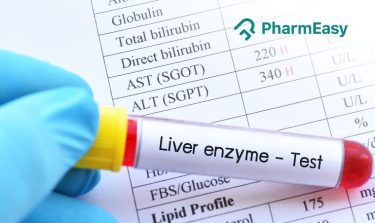
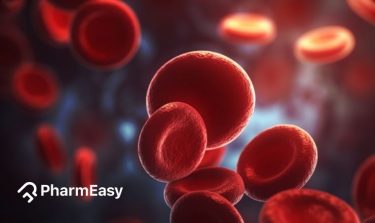





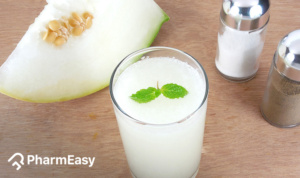


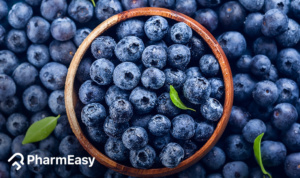
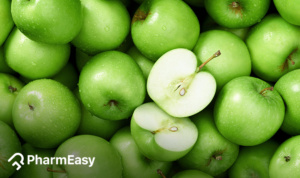
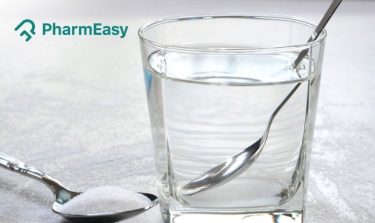



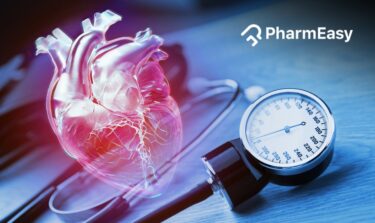




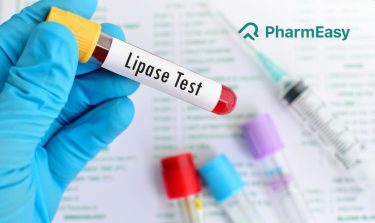

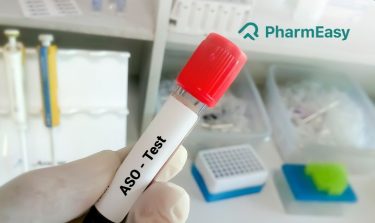

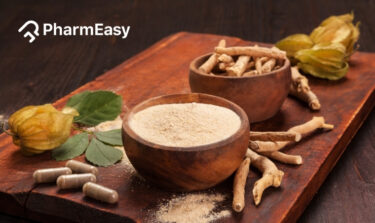


Comments